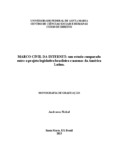| dc.contributor.advisor | Silva, Rosane Leal da | |
| dc.creator | Nichel, Andressa | |
| dc.date.accessioned | 2017-08-21T16:44:47Z | |
| dc.date.available | 2017-08-21T16:44:47Z | |
| dc.date.issued | 2013-12-12 | |
| dc.date.submitted | 2013 | |
| dc.identifier.uri | http://repositorio.ufsm.br/handle/1/11407 | |
| dc.description | Trabalho de conclusão de curso (graduação) - Universidade Federal de Santa Maria, Centro de Ciências Sociais e Humanas, Curso de Direito, RS, 2013. | por |
| dc.description.abstract | The development of Technologies of Information and Communication, especially the Internet, have revolutionized the ways of interaction between individuals, causing the formation of the Information Society . The virtual environment has become part of the population’s everyday life, and where facts of legal significance occur . The regulation of the Internet is a matter that has been discussed worldwide and in Brazil translates as the Civil Landmark of the Internet (Draft Bill nº. 2126/2011 ) . Given such a scenario, the present study aimed to verify whether the draft bill of the Civil Landmark of the Internet is aligned to other Latin American laws regarding the regulation of the Internet and the institutes set forth in the Draft Law nº 2126/2011 are shown sufficient to protect the rights of Internet users . To do so, the method of inductive approach was used, also methods of monographic and comparative procedure and, finally, the research techniques applied were documents and literature. Initially we constructed an overview about the different aspects of the Civil Landmark of the Internet, highlighting in it institutes to be observed more closely. Subsequently, we sought in Argentina, Chile and Uruguay laws that regulate Internet and observed the treatment of prior elected institutes. After work, it is concluded that in a general aspect, the Civil Landmark isaligned with the predictions that regulate the Internet in other countries and is even ahead of them in various aspects and better prepared to protect the rights of network users. | eng |
| dc.language | por | por |
| dc.publisher | Universidade Federal de Santa Maria | por |
| dc.rights | Acesso Aberto | por |
| dc.subject | Marco civil | por |
| dc.subject | América Latina | por |
| dc.subject | Latin America | por |
| dc.subject | Information and communication technologies | eng |
| dc.subject | Sociedade informacional | eng |
| dc.subject | Informational society | eng |
| dc.subject | TICs (Tecnologias de Informação e Comunicação) | por |
| dc.subject | Internet regulation | eng |
| dc.title | Marco Civil da Internet: um estudo comparado entre o projeto legislativo brasileiro e normas da América Latina. | por |
| dc.title.alternative | The civil landmark on the internet: a comparative study between the brazilian draft bill and Latin America laws | eng |
| dc.type | Trabalho de Conclusão de Curso de Graduação | por |
| dc.degree.local | Santa Maria, RS, Brasil | por |
| dc.degree.graduation | Curso de Direito | por |
| dc.description.resumo | O desenvolvimento das Tecnologias da Informação e Comunicação, especialmente a Internet, modificou as formas de interação entre os indivíduos, dando ensejo à formação da Sociedade Informacional. O ambiente virtual passou a fazer parte do cotidiano da população, sendo local onde ocorrem fatos de relevância jurídica. A regulamentação da Internet é questão que tem sido discutida em nível mundial e no Brasil se traduz no Marco Civil da Internet (Projeto de Lei nº 2126/2011). Diante de tal cenário, o presente trabalho se propôs a verificar se o projeto do Marco Civil está alinhado às demais legislações latino-americanas no tocante à regulamentação da Internet e se os institutos previstos no Projeto de Lei nº 2126/2011 se mostram suficientes para proteger os direitos dos usuários brasileiros. Para tanto, fez-se uso do método de abordagem indutivo; métodos de procedimento monográfico e comparativos e, por fim, as técnicas de pesquisa aplicadas foram a documental e bibliográfica. Inicialmente construiu-se um panorama acerca dos diversos aspectos do Marco Civil da Internet, destacando nele institutos a serem observados mais atentamente. Posteriormente, buscou-se na legislação da Argentina, Chile e Uruguai normas que regulamentam a Internet e observou-se o tratamento dado aos institutos antes eleitos. Ao fim do trabalho, conclui-se que em um aspecto geral o Marco Civil está alinhado com as previsões que regulamentam a Internet nos demais países, evidenciando, inclusive, pioneirismo em prever alguns dispositivos que visam a proteção dos direitos dos usuários da rede. | por |
| dc.publisher.country | Brasil | por |
| dc.publisher.initials | UFSM | por |
| dc.subject.cnpq | CNPQ::CIENCIAS SOCIAIS APLICADAS::DIREITO | por |
| dc.publisher.unidade | Centro de Ciências Sociais e Humanas | por |


